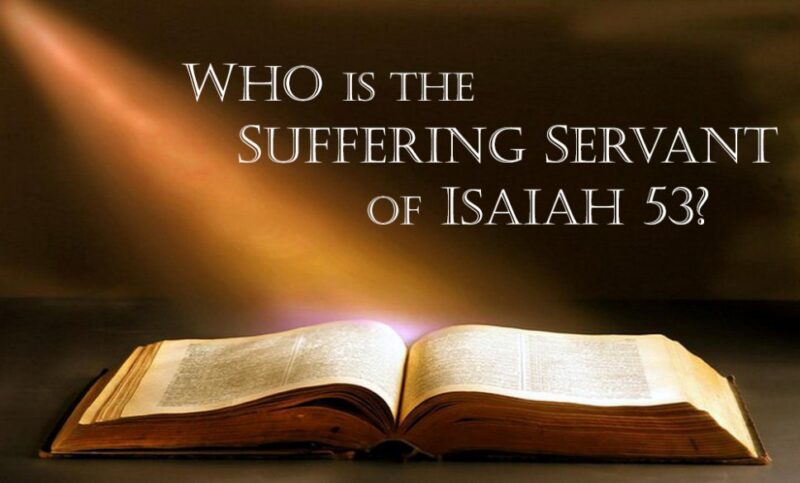Moshe's Incredible Sense of Responsibility

In last week’s article, we reviewed the six main attributes of the parah adumah (disgraced, unblemished soul, occupied fully with Torah, a tzaddik who exhibits true shiflut, yet despised by the nation) and challenged the reader to see the connection between those attributes and the suffering servant of Yeshayah 52:13-53:12. As a follow up to that article, we will explore further this topic.
Ask most Christians to identify the suffering servant and they will tell you that it refers to the Messiah (whom they identify as Jesus). Ask most Jews the same question and they will tell you that it refers to the Jewish People. How can we explain this, that ostensibly the same passage can be understood so differently by two different groups of people? We could answer that it’s the result of bias, ignorance, hidden agendas, maybe even translation issues, etc. but we believe that all of those possible answers are judgmental at their root and entirely miss the main point. Rather, we can answer the question without judging or attributing ulterior motives to anyone by simply reminding ourselves that there are four basic levels for understanding our prophetic writings, pshat, remez, drash and sod, collectively known by the acronym Pardes [meaning ‘orchard’]. For this discussion, we need only to focus on pshat and drash. Pshat refers to the straightforward meaning of the passage whereas drash refers to a deeper level understanding based on Midrashic sources, a collection of insightful, interpretative teachings on our holy writings from our Sages of blessed memory.
The passage opens with three words (Yeshayah 52:13) הִנֵּה יַשְׂכִּיל עַבְדִּי (Behold! My servant will become wise). The question is, ‘Who is this servant?’ And the answer is, ‘It depends.’ Yes, it depends. It depends on the level of Pardes that one is dealing with. If one is focusing on the pshat, the answer is that the servant corresponds to the Jewish People; however, if one is interested in the Midrashic perspective, the answer is that the servant corresponds to Mashiach. This is stated explicitly by the Ramban at the beginning of his explanation of the passage: הנכון בפרשה הזאת שהיא על ישראל כלו כלשון אל תירא עבדי יעקב ויאמר לי עבדי אתה ישראל אשר בך אתפאר וכן רבים אבל על דעת המדרש המיחס אותה על משיח צריכים אנו לפרש אותה כפי דברי הספרים (The correct explanation of this passage is that it refers to Yisrael as a whole, such as ‘Do not be afraid, My servant Yaakov’ [Yirmeyah 30:10] and ‘And He said to me, You are My servant Yisrael in whom I glorify’ [Yeshayah 49:3], and many others; however, according to the opinion of the Midrash that relates it to Mashiach we need to explain it according to the words in the [holy] books).
Now let’s read the entirety of the first verse of the passage (52:13): הִנֵּה יַשְׂכִּיל עַבְדִּי יָרוּם וְנִשָּׂא וְגָבַהּ מְאֹד (Behold! My servant will become wise; he will become exalted and elevated and be very high). A well known Midrashic source known as the Yalkut Shemoni expounds on these words (Perek 52, Remez 476): זה מלך המשיח ירום מן אברהם ונשא ממשה וגבה ממלאכי השרת (This is the king Mashiach; he will become exalted above Avraham, and elevated more than Moshe, and he will be higher than the ministering angels). So we see clearly that this passage does, in fact, refer to Mashiach, and not just to the Jewish people as a whole.
But before we go further, we should ask ourselves a really fundamental question. Why do we need such an exalted person to suffer so much for the Jewish Nation in the first place?
A rather lengthy passage in the Tikkunei Zohar (Tikkun 21, 54a-55b) discusses how to be saved from the period of time known as chevlei Mashiach [the birth pangs of Mashiach]. The tzaddikim [righteous ones] are saved from this period of time in the merit of them being completely shomer brit. Admittedly, this comes to include only a small group of Jews. What about the rest of us? The beinoni’im [average ones], who have some merits to their credit but also a number of demerits, are only spared if they do complete teshuvah in conjunction with at least one of the following mitzvot: carefully observe Shabbat and the Yomim Tovim, regularly pray the Shemoneh Esreh (keeping in mind that prayer is service of the heart, not just the mouth), keep the mitzvah of brit milah, or put on tefillin. However, there are many beinoni’im who will not reach even this minimum standard. The only way for the rest of the Jews to be saved during chevlei Mashiach (perhaps with the exception of the incorrigibly wicked Erev Rav among them) is for them to do serious teshuvah. But to be frank about it, the Tikkunei Zohar states that the level of teshuvah that they will need to reach is beyond the practical capability of most of them. Therefore, their judgment will be to die along with the wicked, G d forbid.
But that’s not the end of the story because the Tikkunei Zohar makes it clear that the ultimate fate of the beinoni’im during chevlei Mashiach was made known to Moshe Rabbeinu after the incident of the golden calf, and he refused to accept it: וּבְגִין דְּגַלֵּי כָּל דָּא קוּדְשָׁא בְּרִיךְ הוּא לְמֹשֶׁה שְׁאִיל רַחֲמֵי עֲלַיְיהוּ וּמָסַר גַּרְמֵיהּ לְמִיתָה הֲדָא הוּא דִכְתִיב וְאִם אַיִן מְחֵנִי נָא מִסִּפְרְךָ (And because the Holy One, blessed be He, revealed all this to Moshe [that during the period of time known as chevlei Mashiach many among b’nei Yisrael would die], he sought rachamim for them, and gave himself over to death for their sake, and this is the meaning of ‘And if not, erase me from Your book’ [Shemot 32:32]).
Moshe Rabbeinu didn’t want the beinoni’im to be given the judgment of death along with the wicked for failure to do compete teshuvah; therefore, he argued with Hashem. Let’s continue reading in the Tikkunei Zohar (expanded translation following the Matok m’Devash commentary): וּבְגִין דְּלָא יִתְאֲבִידוּ אִלֵּין בֵּינוּנִיִּים אָמַר מֹשֶׁה וְכִי יֵמְרוּן בְּנֵי עָלְמָא דַאֲנָא כְּנֹחַ דְּלָא בָּעָא רַחֲמֵי עַל דָּרֵיהּ בְּהַהוּא זִמְנָא מָסַר גַּרְמֵיהּ עֲלַיְיהוּ הֲדָא הוּא דִכְתִיב וְאִם אַיִן מְחֵנִי נָא (In order that the beinoni’im won’t be killed since they don’t have the merit of the Patriarchs because they wouldn’t do teshuvah Moshe said in his prayer, ‘Will it be a good thing that the nations of the world will say that I’m just like Noach who didn’t request rachamim for his generation and as a result the whole world was wiped out in the flood, and that would be a ‘chillul Hashem’ in that the people of the world would say that the Holy One, blessed be He, set up a leader for His people who didn’t seek rachamim for them so that they wouldn’t be lost during chevlei Mashiach; at that time he gave over himself for death for them, as it is written, ‘And if not, erase me from Your book’ [Shemot 32:32], i.e. that I also should die with them).
What was Hashem’s response to Moshe’s argument and stance? Continuing in the Tikkunei Zohar, we read (expanded commentary based on the Matok m’Dvash): וּבְגִין דָּא עָתִיד רַעְיָא מְהֵימְנָא לְמֶהֱוִי בְגָלוּתָא בַתְרָאָה וּבֵיהּ יִתְקַיֵּים וְהוּא מְחוֹלָל מִפְּשָׁעִינוּ אִתְעֲבִיד חוֹל בְּגִינַיְיהוּ מְדוּכָּא בַּעֲוֹנוֹתֵינוּ בְּמַכְתְּשִׁין דְּיִסּוּרִין דַּעֲנִיּוּתָא בְּכַמָּה דוֹחֲקִין דְּסָבִיל עֲלַיְיהוּ וּבְגִינֵיהּ וַיִּנָּחֶם ה' עַל הָרָעָה וְגוֹמֵר וְהֲדָא הוּא דִכְתִיב וּבַחֲבוּרָתוֹ נִרְפָּא לָנוּ, (In order that there would be a tikkun for the beinoni’im, the faithful shepherd, i.e. the soul of Moshe Rabbeinu, would be resurrected during the last days of the final exile to bear the transgressions of Yisrael, and in him would be fulfilled the verse, ‘He is profaned because of our rebellions’ [Yeshayah 53:5], i.e. he would appear to be ordinary [unholy, secular], and ‘crushed because of our iniquities’ [53:5], i.e. hammered with lesions and plagues from the tribulations of deprivation and hardship with a lot of oppression and trouble that he will suffer for them, and because of the trouble suffered by Mashiach, it is written, ‘And Hashem relented about the bad…’ [Shemot 32:14], and ‘with his wounds we are healed’ [53:5], and therefore, we, the beinoni’im will, in the end, be saved from the calamities of chevlei Mashiach).
There is a lot in that paragraph to unpack and we suggest that the reader take the time to study it diligently. In short, Hashem agreed to Moshe’s offer of giving over his soul to death, but modified it in that He did not agree that he be erased from His book. In short, He told him that He would agree to bring his soul back into this world at the end of days, and that in that future life he could bear indescribable suffering, to be detailed later by the prophet Yeshayah in the ‘suffering servant’ passage, in order to free the beinoni’im from their judgment of death.
Putting together last week’s article with what we have learned here, we should be able to see that Moshe Rabbeinu is not only the suffering servant of Yeshayah’s prophecy, i.e. the Mashiach, but he is also the parah adumah, the mother who is given the task of cleaning up the mess left by her child after he did his business on the floor in the king’s palace (see Rashi to Bamidbar 19:22). Just as the mother knows that it is her responsibility to clean up after her child, so too Moshe Rabbeinu knows that it is his responsibility to clean up the mess of the Jewish People which they left after the sin of the golden calf. And what is that mess? It is the zuhama from the Sitra Achra, i.e. the filthy spiritual pollution contaminating our blood and root source of every impure thought, speech, deed and physical infirmity, which the Nachash reintroduced into the Jewish People after they had been purified of it at the Giving of the Torah. For on the one hand, we read in Avodah Zarah 22b: ישראל שעמדו על הר סיני פסקה זוהמתן (Yisrael, when they stood at Mt. Sinai, their zuhama ceased). And yet we also know what Hashem told Moshe after the sin (Shemot 32:7): לֶךְ־רֵד כִּי שִׁחֵת עַמְּךָ אֲשֶׁר הֶעֱלֵיתָ מֵאֶרֶץ מִצְרָיִם (Go down, because your people that you brought up from the land of Mitzraim have become corrupt). The Nachash re-infected the Jewish People with the zuhama, subjecting them once again to death (along with the rest of the world).
To more fully appreciate the extent of Mashiach’s sufferings, we recommend reading the entire passage in Sefer Yeshayah together with the Ramban’s commentary entitled באור על פרשת הנה ישכיל עבדי להרמב"ן (Explanation regarding the passage, ‘Behold! My servant will become wise’, according to the Ramban). His suffering includes being insulted, disgraced and mocked, being riddled with physical illnesses and diseases, suffering physical deprivations of all types, being accused and convicted of things he never did, bearing the brunt of corrupt government officials, judicial systems and police forces, experiencing physical abuse and even being exiled from Eretz Yisrael. And never once does he speak up to defend himself, for even a single word would ruin everything.
Truly, the love that Mashiach has for his people and the sense of personal responsibility that he feels for them is beyond our comprehension. Even so, may he be revealed speedily in our days so that we may come before him and learn of his ways, even as he learns of Hashem’s ways.






